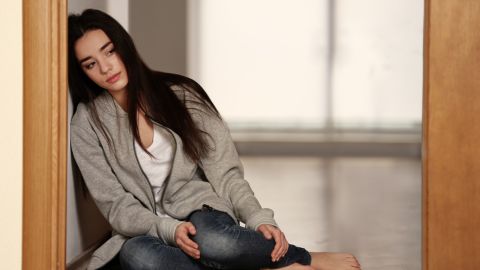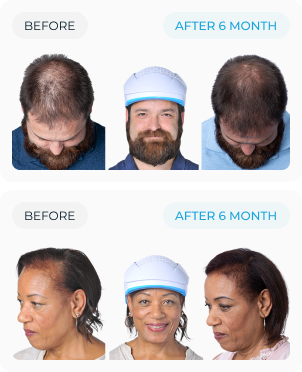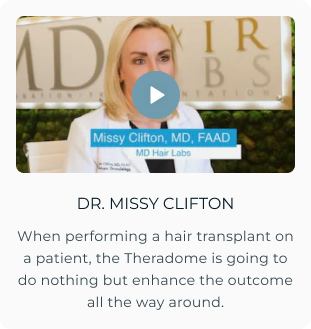Depression can affect more than just your mood - it might also impact your hair. Many people don't realize that there's a link between mental health and hair loss. When you're dealing with depression, your body goes through changes that can lead to thinning hair or bald spots. This can be upsetting and make you feel even worse.
While there’s no solid proof that depression directly causes hair loss, it can play an indirect role. Common side effects of depression, such as chronic stress, poor sleep, and nutritional imbalance, can contribute to hair thinning or excessive shedding. It’s a frustrating cycle where the emotional health and the hair health feed off each other.
In this blog post, we'll look at how depression and hair loss are connected. We'll explore five main reasons why depression might cause your hair to fall out and the ways to treat this problem helping your hair grow back.
Is There Any Link Between Depression and Hair Loss?
Hair loss can be caused by various factors, including genetics, hormonal imbalances, certain medical conditions, medications, and stress. Although stress doesn’t directly cause sudden hair loss, it can exacerbate conditions that do, such as alopecia areata, telogen effluvium, and trichotillomania.
Depression is a mental health disorder characterized by persistent sadness, hopelessness, and a lack of interest or pleasure in activities. Depression can also indirectly contribute to hair loss by affecting behavior and physical health.
Studies showed that there is a bidirectional relationship between depression and hair loss. Researchers found that individuals with major depressive disorder have a 90% higher risk of hair loss and those with hair loss issues have a 34% higher risk of developing major depression.
Seasonal Affective Disorder and Hair Loss
Seasonal Affective Disorder (SAD) or winter depression is also associated with hair-related problems. SAD has affected about 10 million Americans and can lead to a plethora of health problems – including hair loss. Most people diagnosed with SAD experience symptoms before winter, which persist throughout the winter months. Symptoms of SAD can include:
- A drop in energy level
- Cravings for sweet or starchy foods
- Weight gain
- Irritability
- Fatigue
- Difficulty concentrating
- Hair loss and other health problems!
These symptoms should not be dismissed as simply the winter blues. If you notice signs of hair loss, it’s important to begin an effective and natural hair loss treatment to thicken your hair without causing side effects.
Postpartum Depression Hair Loss
Another connection between depression and hair loss is postpartum depression hair loss. Postpartum/Postnatal depression can significantly impact a new mother’s physical and emotional well-being, including hair health. Hormonal fluctuations after childbirth, particularly the sudden drop in estrogen, are a natural trigger for postpartum hair loss.
However, when postpartum depression is present, it can amplify the problem. The added psychological stress, disrupted sleep, and nutritional imbalances often associated with postpartum depression can further weaken the hair follicles, delay regrowth, and prolong the shedding phase.
How Can Depression Lead to Hair Loss?
Depression can contribute to hair loss in several ways. Many experts agree that the high levels of stress and hormonal changes associated with depression can lead to thinning hair or shedding.
However, stress-related hair loss isn't permanent and can be managed. So, getting support for depression, along with healthy hair habits, can help promote hair growth and restoration along with improved well-being.
Here’s how depression can impact your hair health:
1. Physical Stress and Hair Follicles
Depression can cause physical stress on your body, which affects your hair follicles. When you’re under stress, your body might push more hair follicles into a resting phase, leading to a condition called telogen effluvium. This means your hair stops growing and starts shedding more than usual, resulting in noticeable hair loss. Managing stress through relaxation techniques and seeking professional help can benefit your mentally and hair health.
2. Changes in Hair Growth Cycle
Depression can interfere with the natural hair growth cycle. Instead of following the regular cycle, hair follicles may enter the resting phase too soon. This disruption leads to increased hair shedding and slower regrowth, causing overall thinning of the hair.
3. Neglect of Self-Care
During depression, individuals often deal with low motivation and struggle with self-care, including proper hair care practices. Neglecting hair care can lead to hair loss, breakage, and damage.
4. Hormonal Imbalance
Depression can cause changes in the body’s hormone levels, especially stress hormones like cortisol. When these hormones are out of balance, they can interfere with the normal hair growth cycle. The imbalance in hormone levels can lead to hair follicles becoming weaker or entering the resting phase too early, causing hair to fall out or thin over time. Hormonal imbalance from depression is one reason some people experience noticeable hair loss.
5. Trichotillomania
Depression can sometimes lead to a condition called trichotillomania, where a person feels the urge to pull out their own hair. Hair pulling is often done as a way to cope with emotional distress or anxiety. Over time, repeatedly pulling out hair can cause noticeable hair thinning or bald spots. Trichotillomania is linked to depression and other mental health issues, and it can lead to significant hair loss if not treated.
What Are The Symptoms of Hair Loss Due to Depression?
Emotional stress and hormonal changes linked to depression can lead to noticeable hair loss. Here are the common symptoms of hair loss caused by depression:
Sudden Hair Shedding
During times of high stress or deep sadness from depression, you might notice a lot more hair falling out all at once. This can happen a few months after a really tough period in your life.
Patchy Hair Loss
Depression can sometimes make people pull their hair out without realizing it. Trichotillomania can lead to small bald spots or patches where hair is thinner than usual.
Overall Thinning
When depression lasts for a long time, it can mess with your body's normal processes. Persistent depressive disorder, a long-term form of depression, can cause over-stress, poor nutrition, disrupted sleep, and hormonal imbalances. This can weaken your hair follicles and make your hair grow more slowly, leading to gradual hair thinning or increased shedding.
Do Antidepressants Cause Hair Loss?
Antidepressants like SSRI (Selective serotonin reuptake inhibitors) and sertraline (Zoloft) can sometimes lead to a condition called telogen effluvium, which is a temporary form of hair loss. This type of sudden hair loss is often triggered by factors such as stress, illness, and certain medications, including antidepressants.
Telogen effluvium occurs when hair follicles enter the resting (telogen) phase of the hair growth cycle prematurely and are shed earlier than usual. Under normal circumstances, about 85% of a person's hair follicles are in the active growth (anagen) phase, with the remaining 15% in the resting phase.
When the body experiences significant stress or changes due to medication, it can disrupt the hair growth cycle, pushing a larger number of hair follicles into the telogen phase. This results in increased shedding and noticeable thinning of hair.
How to Stop Hair Loss Caused By Depression?
To address hair loss caused by depression, it's essential to treat the root cause: depression itself. While winter depression is a seasonal issue for many, there are effective strategies for hair restoration and improve your overall well-being. Here are three tips to boost your self-esteem while working on both your mental health and hair care.
1) Get 15 Minutes of Sunlight Every Day
Sun exposure is beneficial for treating depression-related hair loss. UV-B radiation from sunlight helps your body produce Vitamin D, crucial for overall health. A deficiency in Vitamin D can lead to various health problems, including cancer, high blood pressure, autoimmune disorders, depression, diabetes, and hair loss. Just 15 minutes of sunlight daily can provide sufficient Vitamin D. Take a quick stroll around the block when the sun is out.
Read More: How Can Sunburn on Scalp Damage Hair?
For additional support, consider using the Theradome laser hair regrowth helmet for 20 minutes twice a week. Many women see a 38% increase in hair count after only 18 weeks of use.
Since medical problems usually affect hair follicles and scalp health, reverse hair loss and thicken your hair by wearing the Theradome laser hair regrowth helmet for 20 minutes twice a week. Did you know that the majority of women see a 38% increase in hair count after only 18 weeks?
2) Incorporate Vitamin D into Your Diet
If daily sun exposure isn't feasible, or if your doctor advises against UV rays, incorporate Vitamin D-rich foods into your diet. Vitamin D deficiency can contribute to depression and hair loss, so it's essential to get enough of this nutrient. Foods like mackerel, salmon, tuna, and herring are rich in Vitamin D. If you’re not a fan of fish, consult your physician about taking Vitamin D supplements.
In the meantime, maintain your hair's thickness and prevent thinning with the Theradome PRO LH80. This hair loss treatment can strengthen hair follicles and make your hair more manageable.
Read more about the connection between Vitamin D deficiency and hair loss.
3) Boost Your Mood with Exercise
SAD can lead to stress, a known cause of hair loss. Exercise is an effective way to combat hair loss caused by depression. Regular physical activity helps control stress levels and promotes overall health, including hair health. Put on your running shoes and take a stroll around the park while soaking up some sun.
Exercise not only reduces stress but also promotes hair growth. Discover how exercise and hair growth are interconnected.
4) Go for a Talk Therapy
Talking to a mental health professional can be an important step in addressing the root causes of depression, anxiety, and related behaviors like trichotillomania. One of the most effective approaches is Cognitive Behavioral Therapy (CBT), which helps you identify and change negative thought patterns and behaviors. Other forms of psychotherapy, such as Dialectical Behavior Therapy (DBT) or Habit Reversal Training (HRT), can also support recovery.
Treating the underlying emotional triggers not only improves mental well-being but can also reduce stress-related hair loss. A holistic treatment plan may include therapy, medication, stress management techniques, and self-care strategies to support emotional health and hair regrowth.
5) Change Your Lifestyle
Practicing self-care can greatly enhance your mental well-being, especially when paired with talk therapy. Maintain a consistent sleep routine, engage in regular physical activity, and follow a balanced diet to boost your mood and reduce feelings of stress.
Summary
Hair loss and depression are closely linked. Depression itself and certain antidepressants can contribute to hair loss. Additionally, the psychological toll of hair loss includes depression, anxiety, and social withdrawal, underscoring a bidirectional relationship between these conditions.
Having said this, with appropriate depression treatment and comprehensive self-care practices, including specific approaches to hair care, it is feasible to effectively manage and reverse hair loss.
Don’t Let the Blues Weigh Your Hair Down!

Women are four times more likely to be affected by Seasonal Affective Disorder (SAD) and experience related health problems, including hair loss. However, there’s no need to dread the winter months or feel alone and powerless. By following the suggestions above, you can overcome depression-induced hair loss and embark on a journey to a healthier, happier you.
Remember, the best thing you can do for your hair is to start laser hair regrowth treatments with the Theradome PRO LH80. Regain your hair and regain your confidence with Theradome's laser helmet. Don't let hair loss define you. Take action today and embrace the journey toward a fuller, more vibrant you.

























